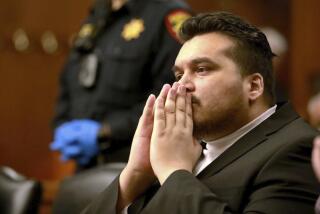Condemned killer’s death investigated as suicide
A condemned man on California’s death row for murdering five people, including the daughter of blues guitarist Elvin Bishop, is dead in what prison officials say they are investigating as a suicide.
Justin Helzer, 41, was found dead Sunday in his cell, where he was housed alone at San Quentin State Prison, according to the California Department of Corrections and Rehabilitation. His brother, also condemned, is incarcerated at the same prison.
He and his older brother, Glenn Helzer, and roomate Dawn Godman were convicted in 2005 for a robbery and killing rampage that prosecutors said started with an attempt to extort $100,000 from an elderly Concord couple. They were accused of kidnapping and killing the couple and then, in fear of being discovered, killing Glenn Helzer’s girlfriend, 22-year-old Selina Bishop, along with her mother and her mother’s boyfriend.
Parts of the bodies of three of the victims were found in gym bags in the Sacramento River Delta. The Helzer brothers were condemned to death. Godman was sentenced to nearly 38 years and remains incarcerated in California.
Corrections officials said Justin Helzer’s death is being investigated as a suicide. They confirmed Monday that in 2010, the younger Helzer “suffered self-inflicted injuries to his eyes when he jammed pens” into them. Department spokeswoman Terry Thornton said she could not comment on the cause without violating medical confidentiality laws.
California currently has 733 offenders on death row, though executions were ceased seven years ago during litigation over the state’s lethal injection method. Since the state’s death penalty was reinstated in 1978, 14 inmates have been executed and 22 have committed suicide.
The level of availability of treatment for mentally ill inmates on death row, as well as a climbing prison suicide rate, are among issues raised by federal courts that found that conditions in California prisons violate constitutional protections. A U.S. District Court judge recently ruled that California has not improved psychiatric care enough to end court oversight.
More to Read
Get the L.A. Times Politics newsletter
Deeply reported insights into legislation, politics and policy from Sacramento, Washington and beyond. In your inbox three times per week.
You may occasionally receive promotional content from the Los Angeles Times.







